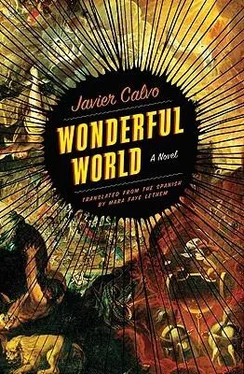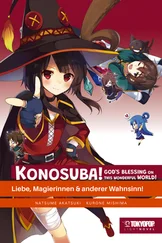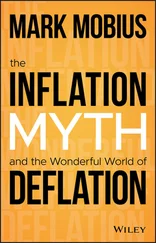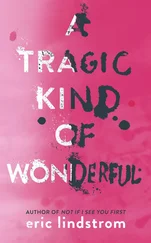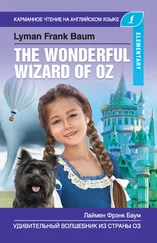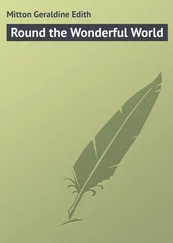“Think of your loved ones,” said Chuck, folding the map and putting it away in the pocket of his camouflage army jacket. The same American army that was now his enemy, and which was decimating them on Capitol Hill. “Of your families and your friends. We still have a chance to save them. I refuse to accept that the process is irreversible.”
Five minutes later, the commandos had gone up the ladder and were in defense formation in some sort of underground room that Chuck identified as the lower section of one of those underground bunkers for the president. Part of the room had collapsed. The Resistance's rockets must have reached the White House.
“Let's go,” he said, and undid the safety on his AK-47 automatic assault rifle — the same rifle that in the last fifty years had become a symbol of political resistance throughout the world.
The systems of bunkers below the White House seemed to be deserted. The elevators were run by magnetic cards, so they were forced to blow out a few doors and go up the emergency stairs. They went up four flights before arriving at the collapsed wall, saving them the problem of having to use explosives that could damage the building's structure even further. But where was everyone?
It didn't take them long to find out.
“Take cover!”
It was the youngest member of the commando team who had shouted. A boy that couldn't have been much more than eighteen years old.
The six team members took cover under the ruins. In that part of the building, the dim light was interrupted by flashes from the explosions outside that came in through the windows.
Chuck extended his neck to look in the direction the boy was pointing. There were half a dozen National Guardsmen, armed and wearing helmets, blocking the hallway right in front of them, beyond the rubble. It was the guardsmen's position that was strange. They seemed to be in a defensive formation, standing in the middle of the hallway, and yet their arms fell motionless at their sides, making the barrels of their guns drag along the floor. They also had their heads bowed, so their chins touched their chests. In that position of deactivated automaton that was beginning to be familiar to Chuck.
Chuck left his hiding spot.
“What the hell are you doing?” said Paul through his teeth from behind Chuck's back.
Chuck raised the palm of one hand to reassure him.
“Trust me,” he said.
He walked up to the National Guardsmen and took off one of their helmets. He waved a hand in front of his face. The guardsman's pupils didn't respond to the stimulation.
“They're not here,” said Chuck. “They're out there. In the battle.”
The members of the Resistance commando unit slowly left their safe positions, but without lowering their guns and looking at their captain warily.
“The collective mind is busy with the battle,” ventured Paul, stopping six feet in front of the National Guardsmen.
“Which means,” said Chuck, “that the entire world is tuned into this battle. Probably the entire colonized world is filled with people like this.” He nudged the chest of the National Guardsman in front of him with the tip of his AK-47. “Which means that we have a chance to get to him. To Doctor Angeli.”
The six members of the commando unit resumed their path, following the signs on the walls that marked the way to the Oval Office. All the White House staff seemed to be at their posts. Sitting in front of their computers. The guides behind their counters. Office workers standing in front of photocopy machines, with their fallen arms still holding pages. There were National Guardsmen everywhere, some of them collapsed on the ground. Chuck and his men moved through them, stepping lightly and avoiding looking directly at their faces. At some point all those abandoned marionettes had been human beings like them. Maybe they still were in some corner of their minds.
They got to the Oval Office without any surprises. Paul blew out the retinal scanners and card readers with controlled explosions. The blasts from the plastic explosives could barely be heard through the thundering of the blasts outside. None of the commando members dared to peek out of any of the windows to see what was going on out there, to see how the battle was progressing.
And there it was, no doubt about it. The president's office. A place Chuck Kimball never dreamed he would visit and which he never would have had reason to visit if it weren't for all the horrible events of the last two months.
“Mr. Kimball,” called out Paul from behind his back.
But Chuck was already making his way down the wide hallway filled with portraits. Walking slowly, with his gun lowered. His face showed uncertainty but also something new, something similar to curiosity or intense expectation. He wasn't sure if his men were following him or if they had remained in the doorway. He felt the carpet of the Oval Office, extremely soft and springy under his feet. The large office windows showed a panoramic view that was very similar to Chuck's idea of hell.
A large part of Capitol Hill was in flames. There were movements of troops around the Lincoln Memorial and — Chuck couldn't help seeing out of the corner of his eye — a black void where the obelisk of the Washington Monument should be.
Chuck walked along the springy carpet. There was someone, or something, in the middle of the office. Sitting in a chair. It was larger than a human being. Chuck stopped and stared at the office's occupant, fascinated. His entire body seemed to be in bandages, with bloodstains on several parts. On the wrists and on the sides and on the forehead. There was no visible head, although the bone configuration of its skull was undeniably similar to the skulls of the Captors, which were structurally similar to snakes'. Where the eyes should be there were two weak yellow lights that could be seen through the bandages.
The office's occupant wasn't looking at Chuck. It didn't seem that it was looking through the large windows either. It seemed to just be concentrating on something going on inside its head.
Chuck approached it cautiously. Now that he was only about twelve feet from it, he could see a bit more of its anatomy. That thing — whatever it was — was one of them, or had been at some point. The bloodstains on its forehead matched the spot where the Captors had those horns that moved like antennae. The bloodstains on its sides could be easily linked to the place where its wings had been, while the stains on the wrists coincided with the spurs the Captors had on the inner part of their reptilian front limbs. So the rumors were true: that this being related to the Captors — or probably the leader or father of them all — had undergone several operations to remove body parts. And the result, thought Chuck, was obscene: Doctor Angeli, if that was what was sitting there imitating the posture of a human being in the Oval Office, had been operated on so he would look more human.
And that was when it happened: while Chuck was thinking about all that, Doctor Angeli's head moved. Just a little, just enough for the yellow lights of his eyes to look in Chuck's direction.
Under that monster's gaze, which observed him as it directed the battle, Chuck experienced an intense feeling of guilt and shame. His hand was tightly closed around his weapon, but he couldn't do anything with it. What Chuck was feeling in that moment, as inexplicable as it was, was very similar to the feeling of a child caught doing something he shouldn't. But that creature wasn't his father or his mother. It couldn't be, Chuck was telling himself. And yet, that was exactly what he felt: an intensely filial remorse and shame. That filled his mind completely. It didn't matter that the conscious and still lucid part of his mind knew perfectly well that that hellish being from another world was taking control of his emotions and his deepest feelings.
Читать дальше
